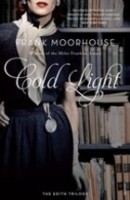Frank Moorhouse, Cold Light (Vintage 2011)
This book came highly recommended by what seemed like the whole world, and I can see what people admire, even enjoy about it.
It’s a rare thing, a novel whose main character lives consciously and deliberately as part of the great historical narrative of her time. Edith Campbell Berry engages with ideas, faces political realities, and tries to wield influence for the good. In the first chapters she has returned to Australia in the early 1950s. She has a hand in the design of Canberra – in fact, her intervention seems to be crucial to the decision to go ahead with Walter and Marion Griffin’s plan for a lake. Through her brother and his partner she is a close-up witness to the Communist Party’s response to Bob Menzies’ failed attempt to ban it, and then to Khrushchev’s revelations about Stalin and the invasion of Hungary. She dines at Menzies’ table, and chats with Whitlam soon after his election in 1972. She works with the International Atomic Energy Agency and is again close to the action when secrets about the English atomic tests in Western Australia leak out. At her death she is a special envoy in the Middle East for the Whitlam government.
Edith is no cardboard cutout. Through all these years, she has to contend with assumptions that women’s place is not among those wielding power. Failing to gain official positions, she bluffs her way past public service obstacles and procedures, works her connections, takes advantage of gossip that she is some kind of spy. Her sexual experiences, and sexual might-have-beens, are unconventional and complex. Possibly the most attractive thing about the writing is the sense that Frank Moorhouse is discovering things about her as the novel progresses. Ambrose, Edith’s husband at the start of the book and the love of her life, is a cross-dresser, and I couldn’t resist the notion that this is a metaphor for the way the author slips into Edith’s skin and clothes – including on occasion her underclothes. Be that as it may, there’s a strong sense of Edith as someone Frank admires and loves, someone who exists independently of him. I didn’t need to be told that there was a real woman somewhere in the background (as Frank told Stephen McCarty at Ubud and on Slow TV a while back – it’s towards the end of the clip). It does feel at the end of the book that one has read the story of a life lived for its own sake and not to enact a writer’s world view. That’s really something.
But, you know, I can’t say I enjoyed the book. It’s the third volume of a trilogy and maybe I should have read the other two books first. As it was, there seemed to be an inordinate amount of recapping, an awful lot of ‘As you know, Bob’. I expect that if I’d read the other books, these would have been less irritating, and I might have had greater tolerance for Edith’s frequent ruminations because of a clearer sense of them perhaps as charting her mental journey. She ruminates on her ideal capital city, on the nature of love, on the lessons to be learned from the League of Nations. I’ve got nothing against rumination, but I couldn’t find anything wise, witty or provocative in Edith’s – I don’t think I’ve ever been so bored in a book that I still wanted to keep reading.
And then there was the sense that Moorhouse had done a huge amount of research and couldn’t bear to let some of it go even though it didn’t quite serve the story. I can enjoy info dumps: my love of Neal Stephenson is partly due to the way he drops in great wads of information, and if Barbara Hambly’s Free Man of Color groans under the weight of her research into the New Orleans society of its time, it is the groaning of a table laden for a feast. But for whatever reason – perhaps because Moorhouse often presents his information as a character’s reveries or as even less plausible conversations – I wondered if the Readers Digest Condensed Version might be a better book. There’s an extremely poignant moment a bit past the novel’s midpoint, where Edith and Ambrose have parted, perhaps forever. And just as she – and the reader – have a moment to absorb the full import of the event, along comes this conversation with her driver:
‘How long will it take the Major to reach London?’ he asked, making conversation.
‘About fifty hours, plus the time from Canberra to Sydney.’
‘Many stops?’
‘Darwin – Singapore – Calcutta– Karachi – Cairo – Rome. I’d rather not talk, Theo.’
‘Of course, ma’am.’
Your mileage may differ, and I hope it does, but for me that was a case Frank the Irritating Researcher interrupting Frank the Passionate Story-teller. When Edith returned to her reverie, the moment for this reader had been lost.
I didn’t hate the book. I did learn from it. I do admire it. I’m glad I read it. It was a slog.



I finally got around to reading this book and I have to say that I identify totally with your comment that – I don’t think I’ve ever been so bored in a book that I still wanted to keep reading. I like your review, because it is close to mine, but yours is better! I wanted to keep reading because there was much that was interesting in it but oh dear! I understand why it was shortlisted for several awards but I also understand why it only won one.
LikeLike